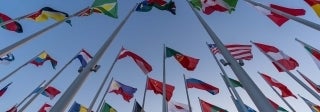
2015 Seminar
Triumphs and Tragedies: The Media and Global Events in 2014
April 19 – April 21, 2015
Punctuated by both diplomatic triumphs and tragedies, 2014 was an extraordinary year for those interested in international communication and diplomacy. The Islamic State of Iraq and Syria emerged from the shadows into the media spotlight, sweeping through large swaths of the Middle East. Ukraine and Russia moved to the brink of war and beyond over the annexation of Crimea. The United States and Cuba surprised the world with the announcement of the first moves towards the normalization of diplomatic relations in over fifty years. While Iran and Western leaders inched painfully forward in negotiations over Iran’s nuclear program. As the year came to a close, hackers seeking to stop the release of a film demeaning Kim Jun un waged one of the most extensive and damaging corporate cyber- attacks in history against Sony Pictures, an attack purportedly sponsored by the North Korean government. These disparate case studies offer fertile examples of diplomatic conflicts and agreements between players of differing geopolitical size and strength. They also highlight the increasingly complex role of old and new media in international diplomacy.
Geopolitical actors of all sizes and shapes are experimenting with new forms of strategic communication that capitalize on the complexities of the diffuse and multi-modal global media system. ISIS not only surprised the West with its swift and precise military offensive but with the sophistication of its social media charm offensive. Even as most social media platforms remained banned in Iran, Iranian political and religious leaders ramped up efforts to bring the Iranian nuclear case to the world through often contradictory English language websites, Twitter feeds, and YouTube videos. Ukraine and Russia faced off in the battlefield as well as in the international court of public opinion, employing hackers, activists, and social media campaigners—utilizing new techniques but often resurrecting familiar Cold War rhetoric. Finally, the startling Sony episode provided another sign of the significance of hacking and cyber war in terms of thinking through the complexities of representation, reaction and retaliation.
Taking these case studies as a starting point, the 2015 Seminar will examine the historical continuities and potential paradigm shifts in strategic communication surrounding foreign policy events and media’s complex and evolving role in diplomacy. Panels will feature academics and stakeholders including diplomats, journalists, activists, and non-traditional media actors invested in shaping these event narratives and outcomes. Questions that will guide the 2015 seminar discussion include:
- To what extent is the proliferation of new communication technologies and corresponding changes in media flows challenging the role of diplomats, journalists, and activists in shaping international understanding of world events?
- How are new techniques upending or reinforcing images of authority surrounding diplomacy?
- How do domestic information and media policies influence foreign policy and international relations?
- How do informational strategies challenge geopolitical power asymmetries?
- What has been the role of non-traditional media and communications actors in shaping these global events?
